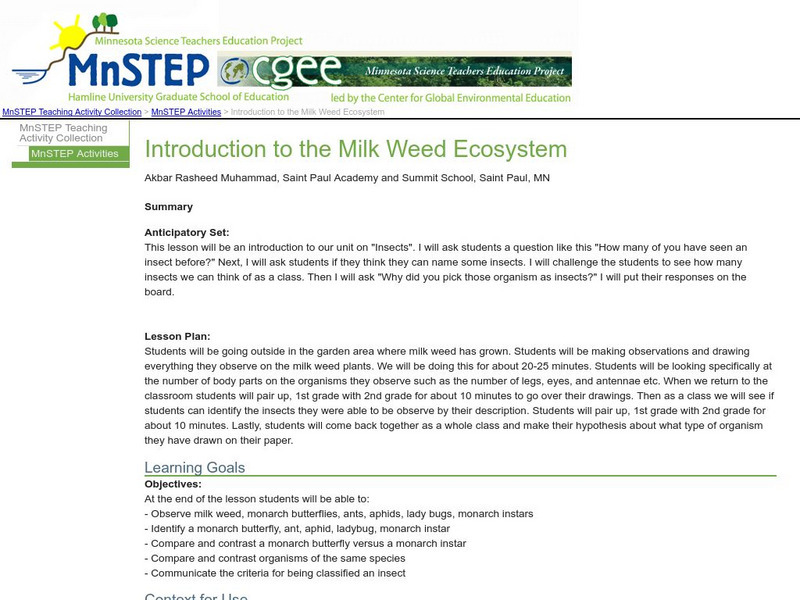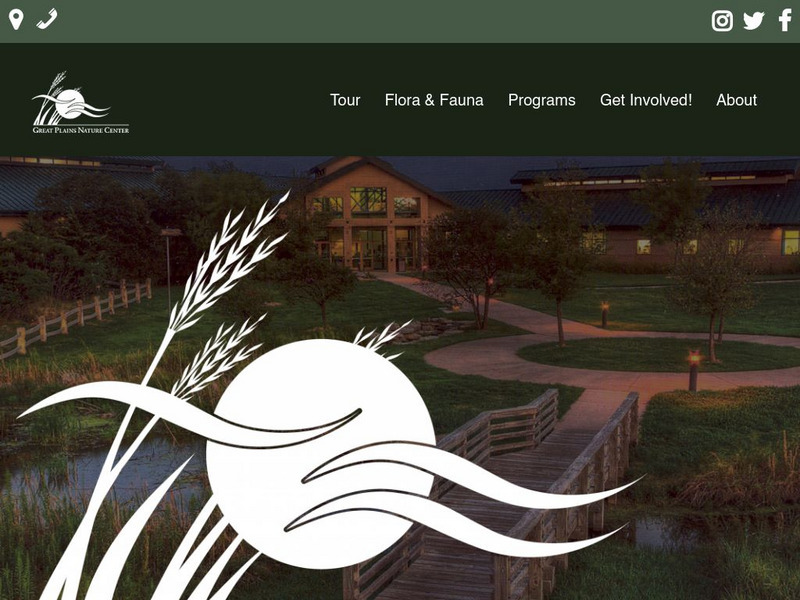Curated OER
Weather Conditions During the Spring Monarch Migration
High schoolers keep a detailed record of weather patterns during the spring migration of the monarch butterfly. The use of weather reports is used to form a class data sheet. This instructional activity connects to the skills of graphing...
Curated OER
Make a Dried Bouquet
Students examine how drying flowers was a popular hobby for Colonial women during the Colonial era in America. They read and discuss an instruction sheet, and create dried-flower bouquets that are hung upside down and tied with a string.
Curated OER
Making Sense of Unusual Findings
Students work on the development of observation skills and seeing how they can be used in different contexts. The lesson is good for helping the beginner and novice, along with encouraging and reminding the expert observer of right...
Science Buddies
Science Buddies: Do Milkweed Bugs Show a Color Preference for Egg Laying Sites?
Milkweed bugs, as their name suggests, have a close relationship with the milkweed plant. The plant produces a milky sap, and toxic compounds, but somehow the milkweed bug is unaffected by them. Instead, it concentrates chemicals from...
Environmental Education for Kids
Eek!: Teacher Resources: Milkweed Check Up
In this lesson, students will locate and identify milkweed, identify signs of ozone plant damage, and determine the severity of ozone damage to individual plants and plant communities. They might also collect injured leaf samples for a...
Unite for Literacy
Unite for Literacy: Mystic Aquarium: Monarchs and Milkweed
Learn about the monarch butterfly's life cycle, its dependence on milkweed, and its migration between Canada and Mexico. Includes audio narration in English and Spanish with text in English.
Ed Koday
Web Archive: Milkweed Bugs
Adults are 9/16 to 10/16 inch long, black, and colorfully marked with reddish-orange on the head, sides of the pronotum (part of the thorax), and the wing covers. They have a Y-shaped head marking and two wide crossing orange bands...
Cornell Lab of Ornithology
Habitat Network: Habitat Feature: Milkweeds
Find out how milkweed plants foster habitat diversity in a backyard ecosystem.
AdLit
Ad lit.org: Reading Discussion Guide: Milkweed by Jerry Spinelli
Young Misha Pilsudski lives on the streets of Warsaw, Poland and struggles with his identity. When he enters the Jewish ghetto and sees firsthand the evil acts of Hitler's Nazi soldiers, he realizes it's safest of all to be nobody.
Cynthia J. O'Hora
Mrs. O's House: Milkweed and Monarch Butterfly Mania
Put students' observation skills to the test with these activities and guides.
Environmental Education for Kids
Eek!: Outdoor Safety: Is It Ozone Damage?
One way we can learn more about air pollution is to study a type of plant that is very sensitive to air pollution. Milkweed is one of these plants. Learn how you can investigate ozone damage by studying milkweed.
Nature Canada
Nature Canada: How to Plant a Monarch Friendly Garden
Information about how to create your own Monarch butterfly garden in your backyard is provided. There are detailed descriptions of the kinds of milkweed and other wildflower plants that a Monarch butterfly needs in order to lay its...
Other
Fermilab Flora and Fauna Virtual Exhibit: The Monarch Butterfly and Milkweed
This site traces the life cycle of the monarch butterfly and contains links for more in depth study of the terms presented.
Science Education Resource Center at Carleton College
Serc: Introduction to the Milk Weed Ecosystem
Students will be making observations and drawing insects they observe on milkweed plants. Then as a class, they will see if students can identify the insects they were able to observe by their description.
Science Education Resource Center at Carleton College
Serc: Changes in a Monarch's Life Cycle
Students will observe and work with monarch larva. Once they have experienced the life cycle we will go outside to observe milkweed and identify the stages of monarch that are seen on the plant. Back inside the classroom we will discuss...
Other
Great Plains Nature Center
Click around in this site from the Great Plains Nature Center for some wonderful pictures and information about the Great Plains. Check the Flora and Fauna section for easy-to-read content on such animals as the bison, fox, squirrel; and...
Iowa State University
Iowa State University: Entomology Image Gallery
This site provides an extensive collection of photographs of insects.
Annenberg Foundation
Annenberg Learner: Journey North: Monarch Butterfly
Resource on the monarch butterfly, which includes migration maps, instructions for tracking and observing migration, and an opportunity to report your sightings. Also provides teacher information and classroom lessons.
Other
Monarch Watch
This is an excellent resource for information about the monarch butterfly that includes information about life cycle, migration, observation, conservation, classroom activities, butterfly gardening, butterfly rearing, and the like.
Read Works
Read Works: Time to Fly!
[Free Registration/Login Required] An informational text about monarch butterflies and their migration patterns. A question sheet is available to help students build skills in reading comprehension.
Curated OER
Graphic of a Milkweed Seed
Check this site out for a lesson in seed dispersal. Following a brief description of seed dispersal, there is a quiz that determines whether you can identify the type of dispersal used by a seed.
Nature Conservancy
Nature Conservancy: Nash Prairie Preserve
Explore the beauty of America's prairies and examine efforts to preserve this vanishing part of America's landscape.
Environmental Education for Kids
Eek!: Prairie Plants
Prairie plants are adapted to spend all day in the sun without drying out. Learn about some prairie plants here.
Environmental Education for Kids
Eek!: Wildflowers
Take an online walk with EEK! and view wildflowers of the woods, wetlands and prairies. Then go outside, take a hike, and see if you can spot any of these beautiful bloomers.
Other popular searches
- Milkweed by Jerry Spinelli
- Milkweed Jerry Spinelli
- Milkweed Bug Diagram
- Milkweed Bug Body Diagram
- Milkweed Jerry Spinally
- Milkweed by Jerry Spinally
- Milkweed Spinelli
- Milkweed by Spinally
- Milkweed by Spinelli
- Milkweed Bugs
- Milkweed by Jerri Spaniel
- Life Cycle Milkweed Bug



















